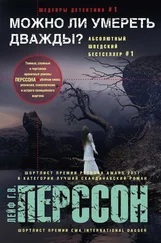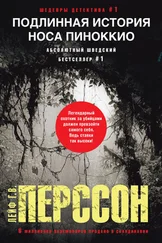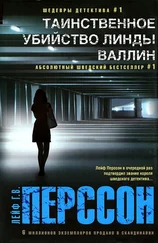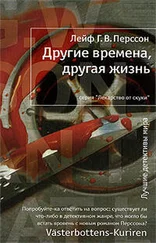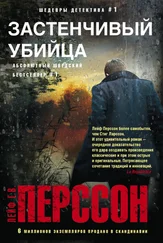“First,” said Wiklander, counting on his long, bony fingers, “there have been suspects noted in the files. Second, they were removed during a review that was done by Chief Inspector Persson a little more than two years ago. Persson — wasn’t he the one who was Berg’s confidant?” And a man who was uniquely perverse, thought Wiklander, who had met Persson and was far from as ignorant about what was going on as he tried to pretend to be.
Bureau Chief Berg and his right hand, Chief Inspector Persson, they were real policemen, thought Johansson with warmth, and now both were out of the building. Persson had retired a year before Berg turned things over to Johansson.
“What’s the problem?” asked Johansson. “Were they Swedes? The accomplices, that is,” he clarified. He at least had thought as much twenty-five years ago as he sat on the couch in front of the TV in the company of his two runny-nosed children. Despite the fact that he had only been a single observer high up in the grandstand.
“I think so, but I don’t know for sure,” said Wiklander, shaking his head. “As I said, they’re cleaned out of the file and I intended to come back to this. On the other hand I’m fairly certain there must have been four of them.”
“You don’t say,” said Johansson. “How can you be so sure of that?”
Wiklander’s suspicions were based on a combination of three factors. For one thing, the same entry appeared in several different registers, which gave a sufficiently clever person with access to all the registers a chance to trace at least some of the erasures that had been made in the register. Obviously — and this was the second factor — assuming that the one who did the cleaning was not as shrewd or careful as the one who checked the cleaning. The third thing was the use of a certain standard format for personnel notations in one of the registers of operatives for the secret police.
“It’s this standard format in one of our registers of operatives that makes me pretty certain it must concern four different individuals,” Wiklander explained. “I don’t know how much you know about computers, Boss,” he added hesitantly.
“Enough,” said Johansson curtly. “I’m listening.” Who do you take me for? he thought.
The connections hadn’t exactly been easy to explain. Wiklander was compelled to run through them twice before Johansson was quite certain he understood how the whole thing stood.
“I’m a hundred percent sure that these four people must have wound up in the current register of operatives,” said Wiklander. “Everyone who’s entered in there has the same format. Simply put it’s a matter of a standardized page for each individual, and it’s the same for everyone regardless of how much information there is about the various individuals in other registers or in their personnel files, if there are any. The link is made the same way for everyone with a reference code of ten characters.”
“But they can’t be so fucking dense that every individual who’s registered or removed is loaded as a separate entry,” said Johansson with a hint of indignation.
“No... not really,” Wiklander replied, shaking his head. That would have been almost criminal, he thought.
“But you’ve figured out anyway that just four individuals have been cleaned out,” said Johansson. “Four forms in a standard format, each of which contains one individual?”
“Yes,” said Wiklander, seeming not entirely displeased with himself.
Around this time two years earlier there had been some rather energetic cleaning in the relevant register of operatives. The various cleaning persons even had to be put on a waiting list while the computer operators executed their orders and the quantity of characters stored in the computer was reduced at the same tempo as the orders were taken care of. Because each order was signed both by the person who requested it and the person who carried it out, it had been no great challenge for Wiklander to find Chief Inspector Persson and his business on the day in question. Not to mention the colleagues ahead of and behind him on the list of secret police officers in need of cleaning.
“This is where they messed up,” said Wiklander. “The character count in the computer is recorded consecutively. So to put it briefly, it’s possible to see how many characters colleague Persson alone had ordered removed. And because I know the number of characters on each form — down to a few dozen — he must have cleaned out exactly four individuals who had been entered in the register because they were included in the event file for the West German embassy.”
“Sloppy damn computer nerds,” said Johansson gloomily. “I hope you stuck the pointer into them.”
“Yes,” said Wiklander. “They were very grateful for the help.”
I can believe it, thought Johansson sourly. What the hell choice did they have?
“Four individuals have been cleaned out — that much is clear — but we have no idea who they were?”
“No,” said Wiklander. “That we don’t know.”
“It can’t have been one of those little elves who were going to take revenge for the West German embassy by kidnapping Anna-Greta Leijon,” Johansson speculated. “If I remember correctly there were at least thirty individuals in jail at various times. Both Swedes and foreigners as I recall. Do any of them seem to have ended up in parliament a few years later?”
“Kröcher and his comrades,” said Wiklander, shaking his head. “No, it can’t have been any of them. As far as the member of parliament is concerned, his name is Juan Fonseca. He was completely innocent, by the way. Got damages as a consolation.”
“You’re quite certain,” said Johansson, looking questioningly at his visitor. Damages my ass, he thought. In certain regards Johansson was an extremely old-fashioned policeman.
“Quite sure,” said Wiklander. “For one thing they’ve been checked out this way and that, and for another they’re still in our registers. There are thousands of pages about them, so there’s enough for a whole raft of dissertations. They come into the story later, after the West German embassy — to take revenge on Anna-Greta Leijon, who was the minister of labor, in charge of immigration issues and the cabinet minister responsible for terrorist legislation. She was the one who in a formal sense made the deportation decision about the German terrorists.”
Forget the law, thought Johansson, who was well aware that to carry out real police work in a crisis situation, you couldn’t run around with a statute book under your arm.
“So we have four individuals who’ve been cleaned out,” he summarized. “We don’t have a clue who they are, despite the fact that this seems to concern one of the most serious crimes that has been handled in this department. Pretty strange,” Johansson concluded.
“Yes,” said Wiklander. “Although that’s not even the strangest thing.”
“Then what is?” asked Johansson, looking guardedly at his visitor.
What was most strange according to Wiklander was that only a few months ago, right before Johansson took over from Berg, two names had suddenly appeared in the file on the West German embassy. What’s more, they were Swedish citizens who were supposed to have helped the terrorists in the embassy in their planning and preparations before the occupation, and who in a formal judicial sense were guilty, among other things, of being accomplices to two murders, some ten cases of kidnapping, destruction constituting a public danger or sabotage, as well as a few other goodies.
“I’ll be damned,” said Johansson. More than enough for life imprisonment, he thought judiciously.
“Yes,” said Wiklander. “Not exactly a recommendation.”
Читать дальше

